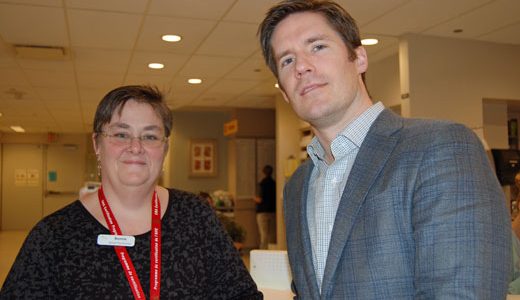Because physicians can’t do it alone
Much has changed since 2009, the year Bonnie Giovannetti began working as the first nurse practitioner (NP) on the VGH Neurosurgery Unit. And, then again, much hasn’t.
Meet Bonnie and you’re immediately struck by her energy and focus on her patients and colleagues. Her unwavering passion to enhance patient care is as fierce as ever and matched only by her abilities to work autonomously as well as part of a team.
“Before I joined Neurosurgery, non-urgent patient issues would have to wait until the end of the day because physicians were in surgery or clinics,” she says. “I’m able to answer patient concerns immediately. I can also diagnose, manage and treat patients. I write prescriptions, order tests and prepare patients for discharge.”
As a constant on the unit, Bonnie provides clinical leadership and communication continuity for the care team, including medical students and residents, while helping surgeons optimize their time.
“Before Bonnie, there were many inpatient tasks that ate up a lot of my time,” explains Dr. Peter Gooderham, neurosurgeon. “Important things weren’t getting done, or were taking a long time. Bonnie takes care of all that, which frees my time to do what only I can do. Having her here has improved patient satisfaction; patients are spending considerably less time in hospital and they have better continuity of care.”
Making discharge successful, not stressful
Preparing patients for discharge and coordinating their transition to care in the community is a large part of Bonnie’s job. She educates patients about what they can expect as they recover, symptom management and outlines required follow up. She also connects with general practitioners (GPs) and a diverse range of services in the community to ease the transition for patients.
“My aim is to make discharge successful, not stressful,” says Bonnie, “which greatly reduces the number of readmissions and emergency visits. Many patients also return to have their sutures and staples removed, and this visit provides another opportunity to ensure things are going well for them.”
“Patients often complain about poor communication,” says Dr. Brian Toyota, neurosurgeon. “Having NPs on the team changes that and I believe it’s the paradigm going forward. Physicians can’t do it alone properly. Without Bonnie, our outcomes wouldn’t be as good.”
A growing appreciation of NPs
Bonnie is one of 40 NPs working across VCH-Vancouver in a variety of acute and community settings. Since the role was established in BC in 2005, she has seen a shift in attitude towards her profession.
“I was lucky; the neurosurgeons on my unit understood the role and actually requested for an NP, but that hasn’t been the case for all NPs.”
Still, it wasn’t always easy in the beginning. “When I started contacting GPs in 2009 to discuss patient’s discharge handover, many didn’t return my calls and others seemed disinterested in what I had to say.”
Today, Bonnie gladly answers GP questions and requests for advice on how to work best with their neurosurgery patients.
“I love the satisfaction of working with a team to provide the best care possible,” she says. “It’s the best job I’ve ever had; I’m appreciated every day.”
Related story
Nurse Practitioners can prescribe narcotics


Lois Budd
Congratulations Bonnie on a job well done. I was one of the people you discharged in 2009 and it all went smoothly. Thank you. I believe that NPs have made a great difference in all the ways that you mention.